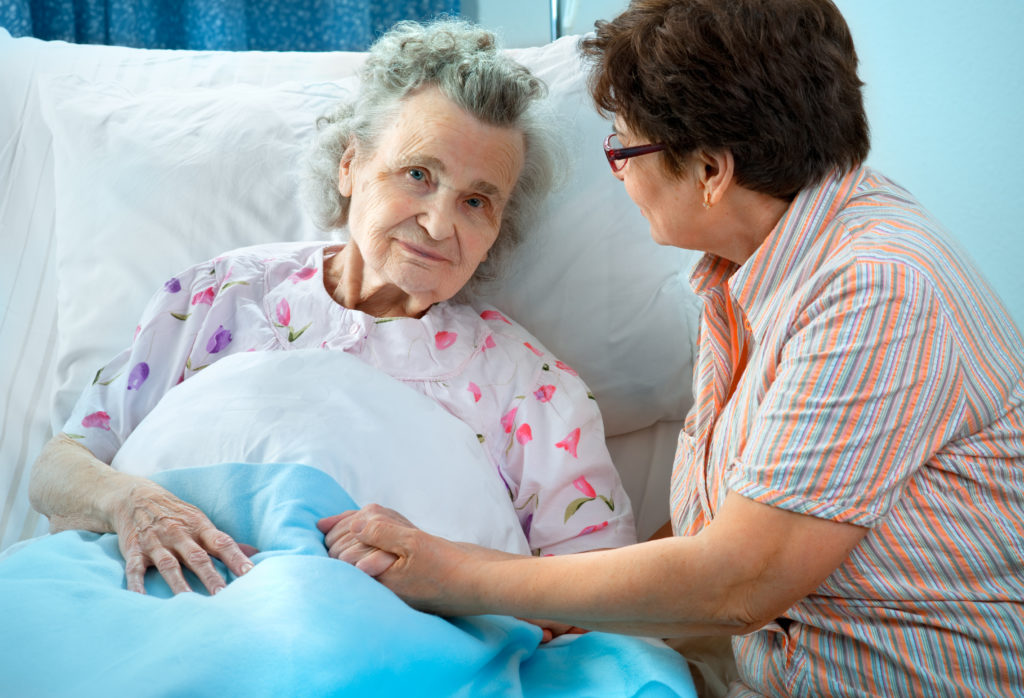
Senior female is being visited by the daughter in hospital
Older adults who are frail are twice as likely to experience delirium following elective surgery than those of an older age, a new study suggests.
Researchers at St. Michael’s Hospital found that a history of delirium, frailty and cognitive impairment are the risk factors most strongly associated with developing postoperative delirium, according to the systematic review, published online today in the Journal of General Internal Medicine.
Previous research by the authors found that frailty and cognitive impairment before surgery are associated with developing complications after surgery, but age is not.
Other risk factors that are associated with developing postoperative delirium include smoking and the use of psychotropic medications, according to the authors.
“Chronological age from your birth date is not always an accurate assessment of how you’ve aged over your lifetime,” said Dr. Jennifer Watt, a geriatric medicine fellow at St. Michael’s and lead author of the review. “This study highlights how common delirium is among older adults undergoing elective surgery, and the importance of geriatric syndromes, including frailty, in identifying older adults who may be at risk.”
The review examined 41 existing studies including more than 9,000 patients 60 years and older and reporting on postoperative delirium following elective surgery.
The researchers found that one in six older adults experience delirium following elective surgery. They also found that patients who had caregiver support are also 30 per cent less likely to experience delirium following elective surgery than those who did not.
Caregiver support was defined in the studies as the patient being married or having a higher number of visitors than average, according to the review. The studies included in the review did not specify whether caregiver support came before surgery, after surgery, or both, according to the authors.
“Previous research has shown that when families delivered a non-pharmacological intervention, such as helping to mobilize or orient the patient, the patient was less likely to experience delirium following hip surgery,” said Dr. Watt. “What we’re seeing in this review may be a result of the fact that they’re doing some of these things for their loved ones already.”
Patients who developed delirium following elective surgery are also at an increased risk of developing other adverse postsurgical outcomes, and are more likely to be discharged to another hospital, a long-term care facility, or die following surgery, according to the review.
Although older adults are assessed for cardiovascular and respiratory risk before an elective surgery, often not enough consideration is given to risk factors that are more common in older adults, including delirium, the authors said.
“Postoperative delirium is a common, yet preventable, complication experienced by older adults undergoing elective surgery,” said Dr. Watt. “Understanding delirium risk factors may help clinicians, patients, and caregivers to target interventions aimed at lessening its burden.”
This paper is an example of how St. Michael’s Hospital is making Ontario Healthier, Wealthier, Smarter.
About St. Michael’s Hospital
St. Michael’s Hospital provides compassionate care to all who enter its doors. The hospital also provides outstanding medical education to future health care professionals in more than 29 academic disciplines. Critical care and trauma, heart disease, neurosurgery, diabetes, cancer care, care of the homeless and global health are among the Hospital’s recognized areas of expertise. Through the Keenan Research Centre and the Li Ka Shing International Healthcare Education Centre, which make up the Li Ka Shing Knowledge Institute, research and education at St. Michael’s Hospital are recognized and make an impact around the world. Founded in 1892, the hospital is fully affiliated with the University of Toronto.
